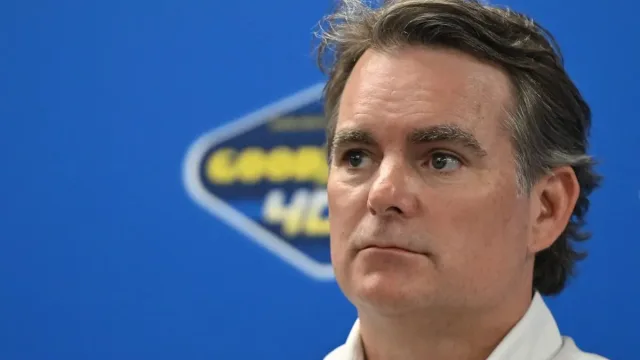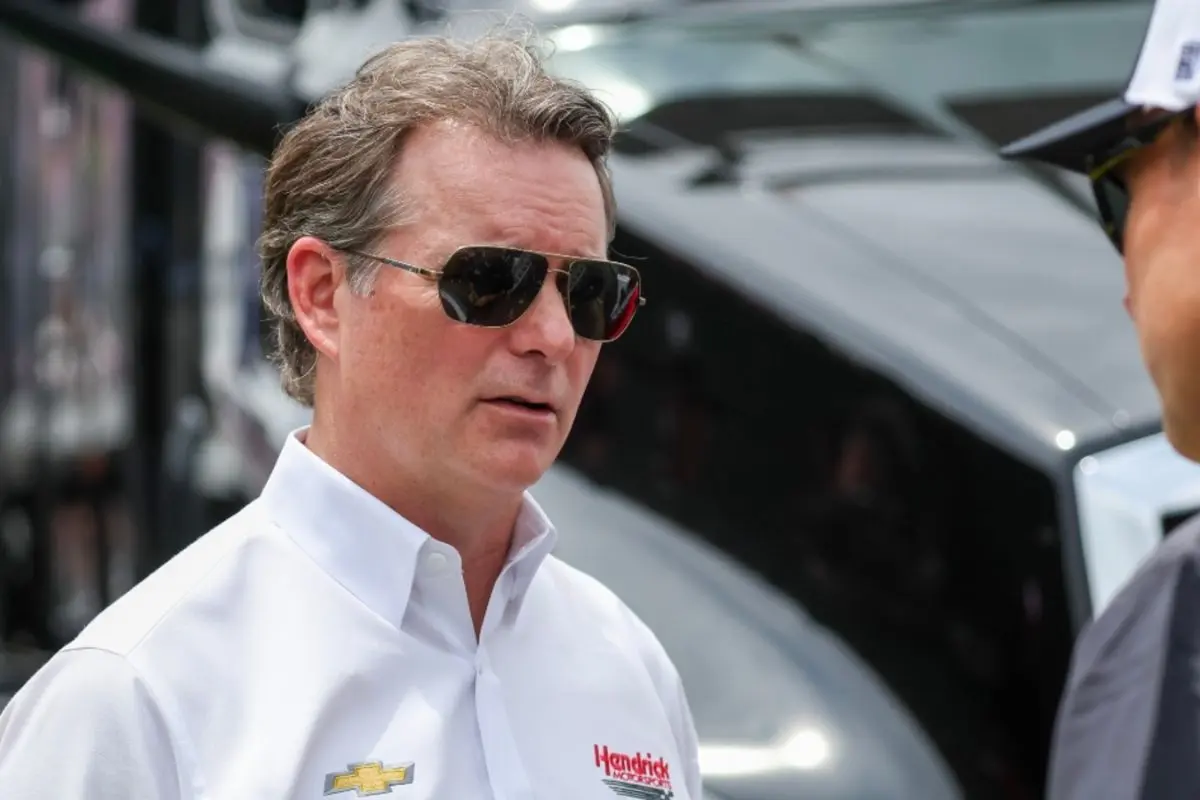Jeff Gordon breaks silence on allegations regarding chevrolet/”>Chevrolet drivers’ manipulation at Martinsville, focusing on the teamwork between Ross Chastain and Austin Dillon. He stressed how important it is to keep racing transparent, saying that such cooperation can undermine NASCAR’s focus on skill and fairness. Jeff Gordon’s remarks echo rising concerns about ethics in the sport, as these types of partnerships can sway race results. He called for a full investigation to protect the honesty and competitive spirit of NASCAR.
Key Highlights
- Jeff Gordon addressed allegations of manipulation among Chevrolet drivers during the Martinsville race, emphasizing the need for transparency.
- He highlighted specific incidents where Ross Chastain and Austin Dillon impeded Brad Keselowski, raising concerns about competitive integrity.
- Gordon asserted that collusion undermines NASCAR’s meritocratic values and called for a thorough examination of race dynamics.
- He acknowledged the tactical cooperation among Chevrolet drivers, noting its influence on race outcomes and individual performance.
- Gordon advocated for evolving regulatory frameworks in motorsports to balance innovation with compliance, referencing Christopher Bell’s wall-ride incident.
Jeff Gordon’s Response to Martinsville Controversies
In view of the recent controversies surrounding the Xfinity 500 at Martinsville Speedway, Jeff Gordon has addressed the allegations of manipulation involving Chevrolet drivers with a measured and analytical perspective.
As the Vice Chairman of Hendrick Motorsports, Gordon finds himself at the nexus of both loyalty to his team and the integrity of the sport. He acknowledged the incidents where Ross Chastain and Austin Dillon appeared to impede Brad Keselowski, suggesting a tactical alignment that could disadvantage their competitors, particularly concerning William Byron’s pursuit of a NASCAR Championship 4 berth.
Gordon emphasized the importance of transparency within the sport, asserting that while competitive tactics are commonplace, the line between strategy and manipulation must be distinctly defined.
He articulated that any perception of collusion undermines the core of NASCAR, where the meritocracy of racing should prevail over orchestrated outcomes. His remarks reflect a commitment to upholding the values of competition, even amid pressures to secure NASCAR championships for his organization.

In dissecting the incident, Gordon called for a detailed examination of race dynamics and driver intentions, urging stakeholders to avoid hasty endings without thorough evidence.
He posited that the intense analysis and heated discussions surrounding the race are indicative of NASCAR’s passionate fanbase, which demands integrity and fairness in every lap.
Jeff Gordon’s Take on Christopher Bell’s Penalty
Controversy often serves as a catalyst for reflection within the world of motorsports, and Jeff Gordon‘s insights on Christopher Bell‘s recent penalty illuminate the complexities of competitive racing. Bell, a driver for Joe Gibbs Racing, found himself at the center of examination following a wall-ride incident reminiscent of Ross Chastain’s audacious maneuver at Martinsville in 2022.
Gordon, a four-time NASCAR Cup Series champion, weighed in on this contentious situation, highlighting the unique dynamics that unfolded during the race. In his analysis, Gordon articulated a sense of disbelief regarding the circumstances surrounding Bell’s actions. He emphasized the significant nature of NASCAR’s regulations concerning wall-riding, noting that such tactics are strictly prohibited when they serve to gain or maintain positions.
“That was a unique set of circumstances,” Gordon stated, acknowledging the race’s unfolding drama while asserting that the sanction was justified. This perspective sheds light on the broader implications of competitive integrity within NASCAR and the ongoing evolution of racing strategies.
“I don’t want to be in the middle of controversy. That was a unique set of circumstances the way that race was unfolding and I think we’re all kind of in disbelief. But the only thing if I were to say, what seemed to me to be pretty clear, and I guess that’s the way NASCAR looked at it too was that they made a rule against riding the wall like that. If it’s going to advance positions or prevent you from losing positions, and that’s what did happen.”
“You try to play out every scenario you possibly can. You work with your OEM teammates to try to make your cars as fast as they can be, as well as try to find ways to work together to help your outcome so when those two guys(Chastain and Dillon) were behind us, I felt pretty confident that they were going to stay there but you don’t know the #24 was struggling. He was driving his butt off and was able to stay ahead of them.” – Jeff Gordon
Moreover, Gordon’s reflection serves as a reminder that as the sport advances, so too must its regulatory frameworks. The enforcement of rules, particularly around controversial maneuvers, is essential for maintaining fairness and ensuring that the racing remains a true test of skill rather than an exercise in legalistic loopholes.
Ultimately, Gordon’s take on Bell’s penalty encourages both fans and participants to engage in a deeper understanding of the intricate balance between innovation and compliance that defines modern motorsports.
Cooperation Among Chevrolet Drivers During the Xfinity 500
During the Xfinity 500, the tactical cooperation among Chevrolet drivers played a pivotal role in shaping the race’s outcome. As articulated by Jeff Gordon, the synergy within the Chevrolet camp allowed drivers to optimize their performance through calculated collaboration. This cooperative dynamic was particularly evident as drivers like Ross Chastain and Austin Dillon worked in tandem, providing critical support to one another while maneuvering the track’s challenges.
The interplay among Chevrolet drivers not only improved their individual chances but also influenced the comprehensive race strategy. With William Byron positioned for a NASCAR playoff run, the implications of teamwork became even more pronounced. Gordon emphasized that despite the competitive nature of the sport, the drivers were acutely aware of the necessity to align their efforts for collective success.
As the race unfolded, the resilience of Byron, despite struggles from his No. 24 car, illustrated the effectiveness of this cooperation. While teammates Chase Elliott and Kyle Larson faced elimination, the calculated maneuvers of the Chevrolet drivers highlighted the importance of collaboration in high-stakes racing. The Xfinity 500 served as a reflection of how teamwork can shape outcomes, leaving an indelible mark on the NASCAR playoffs and the competitive landscape of NASCAR.
Christopher Bell’s Reserved Reaction to the Penalty
The aftermath of the Xfinity 500 brought to light not only the tactical collaborations among Chevrolet drivers but also the individual challenges faced by competitors like Christopher Bell. Following the race, Bell, who drives for Joe Gibbs Racing, found himself grappling with a penalty that ultimately denied him a spot in the NASCAR Championship 4.
His reserved response demonstrated a blend of disappointment and professionalism, as he reflected on the events with a measured tone. In a post-race interview, Bell acknowledged the competitive nature of the race, remarking, “Yeah, I mean it was clear what was going on,” while also expressing pride in his team’s accomplishments throughout the season.
“Yeah, I mean, it was clear what was going on, you know, the #24(William Byron) came back to me probably a straightaway or something, but, you know, I just wasn’t meant to be today and wasn’t meant to be this year. And we accomplished a lot this year and I’m proud of that. So just keep building on it.”
“I’m gonna keep my mouth shut.” – Christopher Bell
“I don’t know what to say.”
Christopher Bell speaks to the heartbreak of missing the Championship 4 pic.twitter.com/IUa033QDkm
— Dirty Mo Media (@DirtyMoMedia) November 3, 2024
His decision to refrain from condemning the penalty speaks volumes about his character and tactical approach. Bell’s reaction can be summarized in four key points:
- Acknowledgment of the Situation: Bell recognized the tactical maneuvers that played a role in the race outcome.
- Personal Reflection: He emphasized the need to focus on the positives despite the setback.
- Sportsmanship: Bell extended congratulations to William Byron for advancing, highlighting respect amongst competitors.
- Tactical Silence: By choosing not to comment on the fairness of the penalty, Bell displayed a tactical restraint that prioritizes long-term relationships and respect within the sport.
News in Brief: Jeff Gordon Breaks Silence on Allegations
In view of recent allegations regarding Chevrolet’s potential manipulation during the Martinsville race, Jeff Gordon’s comments underscore the complexities of teamwork and strategy within the NASCAR framework. The implications of Christopher Bell’s penalty highlight the delicate balance between competitive integrity and cooperative dynamics among drivers.
As the narrative unfolds, continued examination of these interactions will be crucial in understanding the broader impact on racing ethics and the relationships among manufacturers and their teams within the sport.
ALSO READ: Jeff Gordon’s Bizarre Night With Dale Sr. and the Crazy Live Shrimp Incident




Funny thing to me there’s only mention of Chevy drivers and none at all on the 23 Toyotas conversation about all the sudden thinking he has a flat tire.please consider one consider all !!
NASCAR is becoming like Washington DC, every manufacturer looking out for themselves just like the Dems and Republicans. Not the fans or the people. Won’t be watching next year!!!
Sooo what about all manufacturers pitting at the same time… superspeedway … are they going to make them pit separately? That’s manufacturing teamwork that changes the results of the pit stop and rejoining the race.???